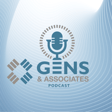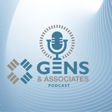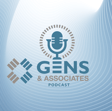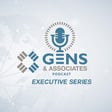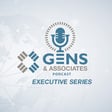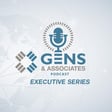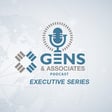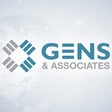Become a Creator today!Start creating today - Share your story with the world!
Start for free
00:00:00
00:00:01

Service Provider Executive Series Episode #4 - Rowan Nidd (NNIT)
In today's episode, host Steve Gens is joined by NNIT"s Rowan Nidd (Head of RA Advisory and MedTech for Europe). Together, they discuss how NNIT has helped its clients with their digital optimization journey, AI/Automation benefits for Regulatory, and what to expect from NNIT in the coming years!
Transcript
Introduction to Steve Gens and Rowan Nidd
00:00:00
Speaker
Welcome to the Gens & Associates Regulatory Executive Podcast Series. I'm Steve Gens, Managing Partner, and today we have Rowan Nidd from NNIT. So welcome, ah Rowan, and I've been looking forward to this. um I know you're been with NNIT for just a little bit, but we go back with our dear friend Priya and have done work together many, many moons ago. so um And certainly know the NNIT folks well. We had Neil's on on the podcast on
00:00:31
Speaker
you know the proper framing of a digital strategy for regulatory. So really looking forward to exploring more of what you're up to with the regulatory practice as you lead that with NNIT.
Rowan Nidd's Career Path and NNIT's Focus
00:00:42
Speaker
So ah for our listeners, before we get started, if you could give a quick background of yourself and NNIT, the regulatory practice, that would be great.
00:00:52
Speaker
Yeah, thanks Steve and thanks again for the lovely introduction. As you say, we go back a long way, so it's lovely to to to get the chance to do this with you. um ah My career has always been in life sciences, so firstly in medtech with what's now Therma Fisher and then before moving into pharma where I work with a lot of large pharma companies including Pfizer, GSK, AbbVie and J&J where I know you were many moons ago, Steve.
00:01:23
Speaker
And then I moved into consulting with, as you mentioned before, you and I worked together for about a year, many moons ago, and then moved um through other consulting houses and have now been at NNIT for about a year now.
Digital Transformation in Regulatory Practices
00:01:41
Speaker
The thing that really drew me to NNIT was its digital focus so and a very strong rack record for digital transformation, system implementations, and and you know including RIMS, regulatory information systems, and the like. and you know As you you mentioned, I lead the advisory the regulatory affairs advisory practice at NNIT. For me, it was a real um you know It was a real sort of coming home. It really allowed me to to focus on the things that I enjoy. And that includes process optimization, digitalization, digital journeys, and really helping companies meet their they they sort of digital goals. The company itself is is headquartered in Copenhagen, but as a global consultancy.
00:02:37
Speaker
we We focus primarily, so it does it it's although it's a consultancy house, as you you probably have got, it focuses very much on digitalisation, so digital consultancy. We do have, we're primarily life sciences life science is focused, with regulatory affairs being a very large part of it, but we do also have other aspects as well, so including supply chain and and other things as well.
00:03:07
Speaker
Yeah, thanks for that intro. And just a yeah few reflections before we get going is you know the thing that I've always enjoyed about NNIT, and I do remember NNIT when it was a lot smaller. And over here in the States, there was a really small Princeton office, probably about 20 miles from our office.
00:03:28
Speaker
And now, you know, kind of a ah full global, you know, consultancies. It's it's been really impressive ah growth. And there's things because, you know, certainly we can identify before, you know, global RIM programs were even a term. We were thinking about it. We were doing research on it.
00:03:46
Speaker
So it's kind of being a step ahead. And that requires a a lot of thought leadership, in our case, the benchmarking. But you guys at MIT have always been a step ahead before the term digital. It was very, very common. You really kind of thought it through the implications.
00:04:03
Speaker
you know, for that, and certainly with your personal experience, you know, having both the med tech and the pharma. um Because I know in our surveys, I think it's around 60% now of companies in our surveys, be it they're a biopharmaceutical or a med tech, there's combination products. So we're in the age of combination
Phases of Digital Optimization and Transformation
00:04:21
Speaker
products. So maybe The first place we can start, you know as regulatory has gone through kind of a massive change, modernization, transformation, they're they're really the big words. But how you guys frame it is, at at the end of the day, it's transitioning to a digital environment.
00:04:40
Speaker
And you know when we see all our research and all our anecdotal, you know working with so many and probably common clients, you because there's been a bell curve of this transition. And there's a phase that anytime there's like a massive change, if it's just say process or systems, or I know one client we worked with,
00:04:58
Speaker
two, three years ago, it was also the operating model that, you know, you'd make your ah your best shot. And there's always an optimization phase. So, and I know you guys do a lot of work in digital optimization. So maybe that's where we can, you know, kind of start on that, like how have NNIT and you have helped clients, not only with the digital journey, but there's a big optimization, you know, kind of push right now.
00:05:26
Speaker
Yeah absolutely and I think you hit the nail on the head with a couple of points there Steve. so you know You mentioned quite a few different sort of company types, of you if you want to call it that. And and I think digital transformation and and digital optimization are nuanced, but are are slightly different. And I can sort of come back to that a little bit. But um you know you mentioned the different company types. And what we're seeing is that there there is quite a ah difference between them. So you know some of the larger companies and some of the more sort of forward-leaning companies are very much in that digital optimization phase as as you talked about where you know it's very much getting the most out of the systems. you know They've gone through or are in the tail end of the digital transformation phase. So now it's just very much
00:06:22
Speaker
you know, how do we get the most out of it? And if you, if you, you know, if you're familiar with the, you know, the D I K W pyramid, where you have not with knowledge and wisdom at the top, it's, it's very much that phase of it. So it's, you know, the focus is on data visualization, intelligent KPIs and predictive analytics. And, you know, that sort of forward how should we say that predictive element of it and how can we use data and that obviously you know bleeds into the automation automatation and AI piece that you know is is is is a very hot topic at the moment. So that's the sort of
00:07:08
Speaker
digital optimization piece and and where we work with that and again this this is where having this sort of digital background if you want to call it or digital focus is is so important and as you mentioned that sort of forward looking view on things is that You know it's very um for us is very much about working with clients to be able to get the most out of their systems you know how can they have all spent a lot of money time and effort with these systems and and how do they actually get it to really fulfill their needs how do they you know how can we how do we work with them.
00:07:48
Speaker
to achieve their vision for the systems to be able to, you know as I said, things like predictive analytics um and and the sort of how do they use that data to to for that competitive advantage.
00:08:01
Speaker
so That's the digital optimization
Mid-Sized Companies and Digital Strategy Alignment
00:08:05
Speaker
piece. And and and as as you know, that that this is very much the companies that are sort of, I should say, at the tail end of that digital transformation piece. Whereas um within the industry, where the and it tends to be the more mid-sized companies or or some of the companies that have focused less on digital previously, who are now in that, what I would say, digital transformation phase,
00:08:33
Speaker
And that's, um you know, a I can talk a little bit more around, you know, how how we work with them on that. um And that's obviously the digital transformation will also include the optimization towards the end. But for that digital, um you know, sort of transformation, that's where we work with the clients a lot and and and The way we do that is and now you know bear in mind, and and and you know this from your work as well, and and the work we've done together, that often um how can it companies you know speak with consultants or and get advice, but often they've already started their digital transformation journeys where
00:09:22
Speaker
you know, the best place to to be in, often the nicest place, and the best place to be involved is is is at the very beginning. And the way we do it is we have a very, you know, it's it's very much around and if, you know, it's very much around the vision that they have. So what is their vision? And that can that can be the company's vision. So that'll set their strategy of which and then you'll build the road map off that and then so
00:09:57
Speaker
you know With regards to the vision, it's very it's things like, you know what is your core provision? Well, if you if your core provision is to have 10 new products on the market and in 50 different regions or or markets, well, that's the vision. Then you need to develop your digitalization or strategy to match that vision.
00:10:25
Speaker
and And then your roadmap is very much how you're going to get there. And what we've seen a lot is that with a lot of these projects, you know we hear a lot in the industry about you know people are saying well it's very difficult to get funding for some of these larger digital projects you know there's senior leadership buy-in and these sort of things and and that's where this tying your strategy in with a corporate vision is fundamental because that's how you get that buy-in you know that's how you can speak the language to the people who are listening because by tying your strategy into your your vision
00:11:09
Speaker
you then can, you're talking the same language, you're working towards the, you know, the same thing as a company. And then from that strategy, you built your roadmap, which is, is very much around, you know, what are we going to do when, what comes first, the cost benefit, low hanging fruit, risk reward, that sort of thing. But within that, there's three fundamental pillars, which are,
00:11:37
Speaker
systems, processes and people. um You know, you talked about earlier around, you know, some of the optimization of processes. Well, that's a fundamental part of it, because without optimizing your processes along with the systems, you just do, you know, you do what you were doing before just more efficiently. And if you don't bring the people along with you,
00:12:04
Speaker
you risk and you know you risk the whole thing falling down because you don't have that that buy-in both from the people on the ground but also the senior leadership who who are supporting this project.
00:12:19
Speaker
Yeah, so thanks for that, Rowan.
Measuring Business Outcomes Post-Transformation
00:12:21
Speaker
there There's a lot to unpack. But me just comment on a few things and we'll we'll see if there's any other areas you want to tap into before we kind of move on to the next topic. but um To your point, the the first thing that I wrote down, because I'm a big, and you know me, I'm a big believer on very clear business outcomes and business benefits. A lot of times clients will not have a baseline.
00:12:51
Speaker
and And whenever there's a business case, it's a hypothesis. so So kind of playing on all the work that you do on the optimization. And usually, we think about optimization after like you know the big transformation or modernization. Those business benefits, you know there's always a dip in productivity.
00:13:10
Speaker
We're really big on the bridges model that you have the old way, the new way. It's not a switch. It's not an event. and it's It's the neutral zone. Productivity goes down because there's new ways, you know new processes, new systems, whatever it may be, new operating model.
00:13:25
Speaker
ah like the client we worked with, all of the above, right? um Until there's competency in the new way, but usually about a year into it, well, from the business benefits, it's usually six, 12, 18 months, they're phased in at different times. And some are like, yeah, we got that, right? Oh, wow, this is a lot more. Yeah, that was a good idea. But we're not seeing that benefit. Or maybe there's something new. So the point that you're making,
00:13:49
Speaker
about having an intelligent metrics you know is so critical. We're going to be updating our regulatory metric body of work over the next six months. um The other thing too is I know you guys have done a lot to help companies frame their digital strategy.
00:14:05
Speaker
um And a lot of times having, and especially now, there's so much experience out there that companies that are maybe getting late to the game in on this, it can actually accelerate it with you know this experience. But I'm kind of curious too, do you have client situations? Because
Ensuring Digital Strategy Assurance for Clients
00:14:21
Speaker
Priya and I and Greg had won this past summer.
00:14:24
Speaker
really enjoyable. And they were going through, they have a digital strategy for regulatory, and there was all these kind of requests for the project. And I said, well, you know, basically what you're asking for is an insurance policy, because I used to do that at J and&J, bring in some really good consultants, because I think we know um what it is, but what are we missing, being paranoid on what we're missing? So I'm kind of curious, do you guys get brought in?
00:14:49
Speaker
where they kind of, you know, because more of the advanced clients, they all usually have a good sense, and you're not starting from scratch, the road mapping, and all the stuff that you do. But do you find that you get brought in just more as that insurance policy? What are we missing? You know, what what are you confirming? You know, what's the gap that type of work? Because that's, and that's kind of in the optimization bucket, too.
00:15:13
Speaker
Yeah, absolutely. And I would say this varies um very much from from segment to segment and from in know client size to client size. So you know some of the the the larger companies, as you mentioned, are very experienced in a lot of this already. So sometimes, yes, you know we do have we have as many friends as we have clients and and by friends you know sometimes this is a sense check as you mentioned almost a sort of casual sense check and then yes sometimes it is a more formal insurance policy kind of what are we missing and we we go through it with them and and and just help with that process and then
00:16:01
Speaker
for the more such a and it tends to be the more medium companies or or and in cases where it may be a department that's that's less familiar with this process, then yes, we do come in and very much an insurance policy but also a little bit more hands-on with the development of the their strategy and roadmap. So we do do both, um sometimes very light touch all the way to you know working with the vendor selection right down sort of to the real nitty gritty stuff as a well.
00:16:35
Speaker
Yeah, that sounds so you know great. And you know it's just because we we like you guys too. We work with the emerging biotechs and the mid tier and the large tier. And they're all in different places. The old saying, meet the client where they're at.
AI's Role in Digital Strategy and Regulatory Intelligence
00:16:48
Speaker
you know Quite right, absolutely.
00:16:51
Speaker
Yeah, so let's shift gears, because you know the big AI automation you know kind of conversation that's been building, and it's really nice to see as we're coming into 2025, there's so much experimentation that, because I always talk about this, you follow the Gartner hype curve, you know and it feels like a glove. So we're in this period of experimentation about what's real and not. But again, I really appreciate how NNIT frames this, that AI automation,
00:17:19
Speaker
it's not the primary topic, it's a sub-component or maybe to use one of your terms, a pillar under the digital journey. So so what are you seeing with with your clients? And as you know, we're just finishing up the AI automation kind of pulse follow-up study of both the software providers, the transactional players and the niche providers, you know all these startups that are doing generative AI and then you know all our you know our community and industry. So you know what what are you're seeing or what are you telling your clients about? Because it's always about chasing the business value. There's so many ideas out there. But what are the ones from from a regulatory context with AI automation you think are going to break through you know in the coming years? I don't think it's it's not happening overnight. But what what are you seeing out there? There's a lot to unpack in that.
00:18:12
Speaker
says So just going back a little bit, just as a sort of a ah context to to what you were saying, so we follow the Gartner hype curve very closely as well, because, you know, and and and and I think, you know, you're absolutely spot on. It is very sort of accurate as as to to where we are at the moment. um And like and um I think AI at the moment is is probably a little bit like Silicon Valley in the 90s. As you said, you know there's a lot of there's a lot of players out there. There's a lot of ideas and and there's a lot of excitement around it, which is which is great. and But what we're seeing from certainly a lot of that you know the clients we're speaking to is there's also a little bit of and little bit of confusion and a little bit of, well, is this the right
00:19:05
Speaker
not so much use case but particular provider is this what um you know is this is this the right people to to to use is this the right solution so I think in that in that regard it's an interesting one I mean we do have our own we do have a very large AI group at NNIT and we do produce AI solutions but so So maybe, you know, so i've I've got some, you know, obviously opinions about that. But from the client side, I think, you know, there's a few use cases that I think are quite common. And, you know, Steve, umm I'm sure you hear them as as well. You know, the most common is the sort of response to HA questions. How do you know, AI seems like a natural
00:19:58
Speaker
way to optimize that regulatory intelligence, text creation, structure content, authoring, authoring automated hyperlinking for submissions and that sort of thing. So these are common use cases and there are different providers out there. I think though more importantly from from what we are seeing and you know a lot of the discussions we're having is that I think what everyone needs to remember and this is this is both for the you know the the people interested in bringing in AI but also for some of the AI providers that whatever discussions you have you need to have IT at the table and the reason I say that is because and it's the reason in an IT we've gone for a and more ah enterprise
00:20:52
Speaker
These are also the solutions we're seeing, getting more traction. And that's simply because a lot of the IT departments don't want to be dealing with 30 ai solutions you know niche solutions niche providers you know, having to maintain that, maintain security on it and and all of that sort of things. So, um you know, what we are seeing is that where some of the come where some of the AI solutions are getting traction is where they are more enterprise wide and then, you know, that have applications that can be used to fulfill some of the use cases that among others I've just mentioned.
00:21:40
Speaker
Yeah, and certainly we agree with that perspective, because I think even with our 2024 world-class room, what we put out in the public eye, you know kind of have ah yeah a position that in regulatory, um and we have to be careful with the term tactical and strategic, but no tactical benefits, because I would put the health authority, Q and&A, because you have both the ingestion and the AI for mining,
00:22:04
Speaker
correct reg and tell is just you know that that i we really believe that will be solved with ai a little later you know yep you know it's not right around the corner as far as months but in the coming years it's it's just really interesting the whole generative ai but those are tactical, um you know, I think Greg has the opinion too, that when you look at an enterprise and discovery, early development, ah certainly how things are progressing in safety, you know, correct all case things, those are very, very significant.
00:22:40
Speaker
So we we think in regulatory, it's, and if you look at the you know different technologies over the years, it's it's been really kind of incremental change, except over the last 10 years in regulatory, just like manufacturing went through it, e-clinical, Salesforce automation, you have a period of, we call it modernization, where there's a massive simplification, you know and really more to kind of the platform.
00:23:05
Speaker
data standards, data quality, and governance standards, all those things to have a well-run operation that can benefit them, the new foundation for all this you know AI automation that's out there. So you know the last thing, and we could we could talk about this for the next hour. I was going to say, yeah there was already a couple of points there I thought, yeah, i could yeah I'd love to chat more about.
Future Focus: NNIT's Digital Strategy and Industry Involvement
00:23:33
Speaker
Yeah, so maybe you know for our listeners, um you know where's the regulatory practice at NNIT going? I know you guys will continue to do a lot with the the digital aspect. you know That's been, in some ways, your bread and butter. You talked about that you know and started pushing digital long before people were thinking about it. But you know besides that, what what are other things people should know about the the regulatory practice at NNIT?
00:24:00
Speaker
As you mentioned, you know, the digital is the very much the core of what we do. A lot of the thought leadership around that as well. And you touched on it as well, Steve. um You know, there is a slight difference now between what I would say large and mid-sized companies, because as I mentioned earlier, you know, with the sort of the slightly more sort of digital implementation versus digital optimization. So we'll continue to do to do that, that is very much the bread and butter of what we do. um Obviously, the AI piece, as I mentioned, where we're heavily and involved in that. But one of the things that AI has done, and and and I think, you know, not obviously, I'm a massive fan of the of of of of the, you know, the global the prim survey, is
00:24:56
Speaker
because you highlighted and you focus a lot on it as well is data readiness and it's it's put a real view on the importance of data and so we we are we are although we've always focused on it we are putting a lot of attention into data now so master data management data We do have our own, you know we are now doing data readiness ah checks and data readiness assessments for for clients, you know getting them ready for that journey. A lot of them um for AI, but also a lot of them because you know every everyone now is realizing it's part of this.
00:25:40
Speaker
digital optimisation piece the importance of data So that's a focus very much of ours as well. IDMP, which you know right um comes up and down a bit like Waze, that's very much a burning platform now. So that's that's one of our ah big focuses. And um we are also focusing a lot more at the moment on mid-tech companies because as As you know, a lot of the MedTech companies now are starting to move through this digitalization process, through this digital journey. and
00:26:22
Speaker
so yeah that that's so we're we're sort of able to We're focusing on them to be able to to help them in that journey. So that's that's very much sort of in ah in a nutshell, very much what we've always been doing, but we're just adjusting to a lot of the market trends that we've seen and have seen coming for the last couple of years. And we predict all will be the trends in the future.
00:26:48
Speaker
Yeah, sounds like a busy ah book of business hearing. And I do like your term. And I obviously was on mute wendy yeah as you were you know talking, but in some ways, I had a big smile on my face. The IDMP waves, because it has been waves. We're going in on year 10, I think, on the IDM legislatively mandated you know kind of wave. So it looks like it's close to being through. And you know we do a lot in our surveys and you know just more of a reminder to our audience that we did prove out it was 63 companies empirical data. There's no correlation with data quality and the data entry method. If it's you know distributed, if it's centralized or some type of you know hybrid model, it's about the maturity of your data governance practices. And in this age of cross functionality,
00:27:40
Speaker
consistency of data governance across functions, you know, you you you work with many of them on that. And it's also interesting, too, because, you know, the med tech, some of our med tech clients, oh, we're behind by, you know, five, seven, 10 years ah with the biopharmaceutical side, but then there's areas that they're actually further ahead, you know, because it's more of that you know, engineering paradigm um that they up bring to the table. And as you know, the software market's very different. You know, you have, you know, certainly have Viva over there, but you have Rimsys and Regdesk who are all doing, you know, very, very well. So it's is it just such a different market. And with combination products, I'll go back to kind of where we started, you know, these combinational products, you you have to have excellence in both. So it's great that you guys are spending a lot more time
00:28:31
Speaker
in the med tech thing, I think they're going probably through the start of their modernization you know cycle. So um with that said, you know always enjoy the conversation, Rowan. um And you know typically when we do these podcasts, you know some of the listeners might want to get a hold of you or NNIT.
Conclusion and Contact Information
00:28:49
Speaker
So how should they go about that you know through LinkedIn or you know website? you know What would you recommend to our listeners who want to get a hold of you?
00:28:58
Speaker
yeah thanks steve um and just just to say i wasre smiling um to your comments that you made there because you're completely on the money. um If we had more time, we could delve into those. But yes, um to contact myself, I'm very active on LinkedIn. So as Steve mentioned, Rowan Nidd, a slightly unique name.
00:29:20
Speaker
um don't like yourself, Steve, I think I'm the only one on LinkedIn or otherwise through the website nnit.com and submit a query and it's monitored 24-7 so someone will will get back to you and I'll pass it on to myself.
00:29:39
Speaker
All right, thanks. And for our listeners, you know, I'm also all over LinkedIn, and it's nice to have a unique name, Rowan. That makes it easier on the search or we have the contact tab off the Gens and Associates website. So thanks again, Rowan, for joining and kind of sharing what you're up to, what the regulatory practice at NNIT, you know, some nice exchange there about kind of this digital AI automation future that everybody's trying to maneuver through. It's going to be a really interesting year. I think there'll be you know ah less questions and more answers towards the tail end of 2025 into 2026 on this topic. So thanks again for joining, Rowan. Yeah, thank you, Steve. As always, it's a pleasure to chat. And as I said, I love the world classroom survey and the work that you're doing.
00:30:33
Speaker
Okay, thanks so much. Thanks a lot.
